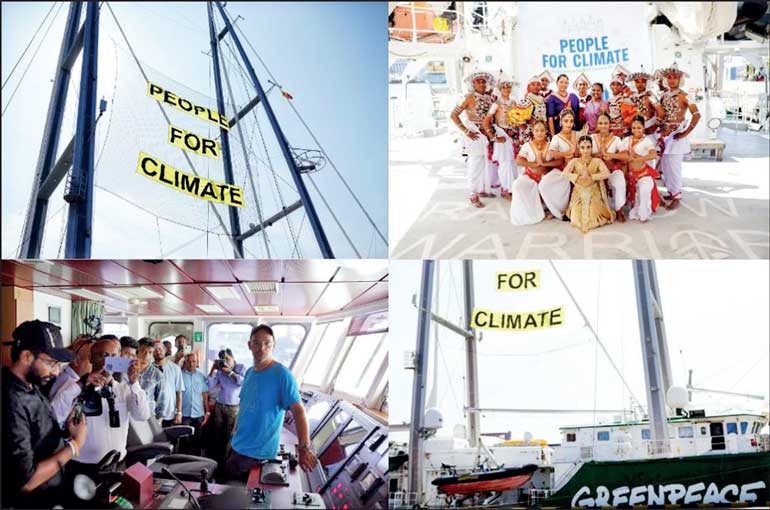Saturday Feb 21, 2026
Saturday Feb 21, 2026
Wednesday, 14 February 2024 00:19 - - {{hitsCtrl.values.hits}}

Greenpeace has launched its South Asia regional office in Colombo with the arrival of the iconic ship Rainbow Warrior, marking the beginning of the highly anticipated ‘People For Climate – Greenpeace Indian Ocean Ship Tour 2024’.
The opening ceremony, which was held onboard the Rainbow Warrior, set the stage for an inspiring journey focused on collective action demanding accountability and resilience in the South Asian region.
The welcome ceremony was a vibrant celebration of unity and collaboration, featuring a captivating cultural performance that showcased the rich heritage of Sri Lanka. The ceremony was graced by key guests, including influencers, youth groups, authorities, celebrities and allies who joined Greenpeace in its mission to tackle climate change.
“Here in Sri Lanka, we’re experiencing an environmental crisis, with climate change disrupting our agriculture and livelihoods. Despite our minimal role in contributing to climate change, as a biodiversity hotspot in Southern Asia, we’re disproportionately impacted. It’s imperative for us, alongside Greenpeace South Asia and other local environmental movements, to advocate for a dedicated climate change foundation in Sri Lanka,” said Environmentalist and Greenpeace South Asia board member Jehan CanagaRetna.
Participants engaged in discussions emphasising the urgent need for regional collaboration to address pressing environmental issues impacting the marginalised sections of the populations. The session sparked hope and determination among attendees, igniting a collective passion for environmental action.
“Over a billion and a half people live in the South Asian region comprising eight different countries which are home to some of the most ecologically sensitive regions in the world. Additionally data shows that the region has the second largest share of the global poor. The multidimensional poverty, dependency on natural resources and weather patterns are just some of the reasons that makes the population of this region particularly vulnerable to the instability that comes with the climate crisis. According to a World Bank report over 800 million South Asians are living in future climate change hotspots, meaning these regions can get increasingly unliveable,” said Greenpeace South Asia/India Executive Director Binu Jacob.
In addition to thought-provoking discussions, the ceremony featured a mesmerising performance by a talented artist, captivating the audience with their powerful message on environmental advocacy. Attendees also had the opportunity to explore a compelling photo exhibition showcasing the life of coastal communities and the climate impacts in the region, further highlighting the importance of environmental conservation.
The Rainbow Warrior’s decks were transformed into interactive spaces, with a VR and entertainment zone providing immersive experiences for visitors of all ages. A dedicated kid’s zone offered engaging activities, inspiring the next generation of environmental stewards.
“Over the years we have all begun to realise that everyone on the planet is a stakeholder when it comes to climate change. While some of us have contributed to accelerating climate change more than others, large parts of the population especially in the global south, including the South Asian region are bearing a disproportionately larger brunt of its impacts. Today it is imperative that every single government, corporation and individual act as a stakeholder in this movement, as this is a very personal cause for each and every one of us. As people of the South Asian region it is especially important we are not weighed down by the complexity of geo-politics and acknowledge the need to speak as one collective voice. Greenpeace South Asia is an attempt at creating one such common platform that can bring together voices from different parts of the South Asian region. There is strength in our numbers,” said Greenpeace South Asia/India Campaigner Amruta SN.
Greenpeace will continue its comprehensive program of events until 18 February, engaging with local communities, youth representatives, policymakers, stakeholders, social media influencers, media, educational institutions, donors, volunteers, and supporters. Together, they intend to work towards collective efforts in addressing issues such as climate change, pollution, and the preservation of marine biodiversity from the perspective of the South Asian region.